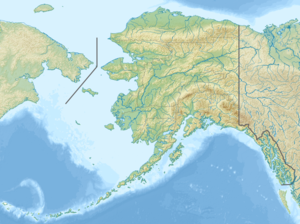| Kvichak River | |
|---|---|
 Kvichak River | |
| Etymology | small river |
| Native name | Kuicaraq (Central Yupik) |
| Location | |
| Country | United States |
| State | Alaska |
| Borough | Lake and Peninsula, Bristol Bay |
| Physical characteristics | |
| Source | Iliamna Lake |
| • location | Lake and Peninsula |
| • coordinates | 59°19′51″N 155°52′56″W / 59.33083°N 155.88222°W[1] |
| • elevation | 46 ft (14 m)[2] |
| Mouth | Kvichak Bay |
• location | 9 miles (14 km) north of Naknek, Bristol Bay, Alaska Peninsula |
• coordinates | 58°52′50″N 157°02′14″W / 58.88056°N 157.03722°W[1] |
• elevation | 0 ft (0 m)[1] |
| Length | 50 mi (80 km)[3] |
| Basin size | 16,830 km2 (6,500 sq mi) |
| Discharge | |
| • average | 503 m3/s (17,800 cu ft/s) |
The Kvichak River (/ˈkwiːdʒæk/ KWEE-jak;[4] Yup'ik: Kuicaraq[5]) is a large river, about 50 miles (80 km) long, in southwestern Alaska in the United States.[3] It flows southwest from Lake Iliamna to Kvichak Bay, an arm of Bristol Bay, on the Alaska Peninsula.[6] The communities of Igiugig and Levelock lie along the Kvichak River.[6] The Kvichak is navigable along its entire length, and is used as a short cut by boats getting between Cook Inlet and Bristol Bay via the Lake Iliamna portage.
The Kvichak River is home to the largest red salmon run in the world. Commercial harvests are worth hundreds of millions of U.S. dollars annually.
The Kvichak River is part of the watershed downstream of the proposed Pebble Mine.
Historically, the river was navigated and subsistence fished by local Alaska Natives. The name of the river means from- or up to- great water, a reference to Iliamna Lake, Alaska's largest freshwater lake.
The Kvichak River was a finalist for the 2017 Riverprize Award for being one of the best-managed and sustainable rivers in the world.[7]
- ^ a b c "Kvichak River". Geographic Names Information System. United States Geological Survey. March 31, 1981. Retrieved November 25, 2013.
- ^ Derived by entering source coordinates in Google Earth.
- ^ a b Orth, Donald J.; United States Geological Survey (1971) [1967]. Dictionary of Alaska Place Names: Geological Survey Professional Paper 567 (PDF). University of Alaska Fairbanks. p. 557. Archived from the original (PDF) on October 17, 2013. Retrieved November 25, 2013 – via United States Government Printing Office.
- ^ "Alaska Sportsman's Lodge | Bristol Bay Sport Fishing Lodge". YouTube. Retrieved 9 August 2024.
- ^ https://uafanlc.alaska.edu/Online/G977K1985a/G977K1985a_02.PDF [bare URL PDF]
- ^ a b Alaska Atlas & Gazetteer (7th ed.). Yarmouth, Maine: DeLorme. 2010. pp. 49–50, 58. ISBN 978-0-89933-289-5.
- ^ "Thiess International Riverprize".
